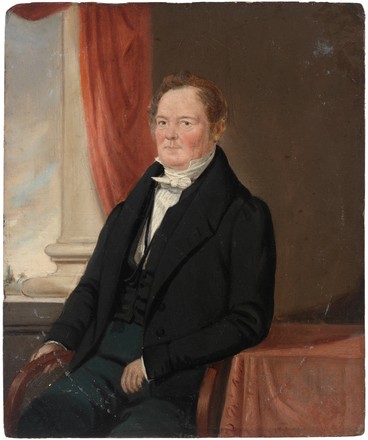
George William Evans
1847
ML 33
Oil painting on board
ML 33
Oil painting on board
The English-born surveyor, explorer and artist George William Evans and his family settled in Sydney in 1802. In 1803, he was appointed to the role of acting surveyor-general in New South Wales, where he made the first of his notable expeditions, exploring the Warragamba River and penetrating upstream to the present site of Warragamba Dam.
Evans’ led many successful surveying journeys during his career. In 1812, he conducted a difficult surveying expedition down to the previously unexplored Jervis Bay, before heading inland to Appin. His discoveries on this journey led to the settlement of the Illawarra district,* which offered rich farming land.
Evans’ accomplishments in the south of the colony were praised by Governor Lachlan Macquarie, and were probably the reason why Macquarie selected him for his most important task: to confirm and extend the earlier discoveries of Blaxland Wentworth & Lawson’s expedition through the interior of NSW. Evans successfully accomplished the task, reaching the Macquarie River beyond the Bathurst plains, becoming the first European to cross the Great Dividing Range.
This portrait of Evans was painted in 1847 by his father-in-law, the colonial artist Thomas James Lempriere (1796-1852). In 1826 Lempriere’s daughter Lucy married Evans, becoming his second wife.
Footnotes
Australian Dictionary of Biography http://adb.anu.edu.au/biography/evans-george-william-2029)


 Back to list
Back to list